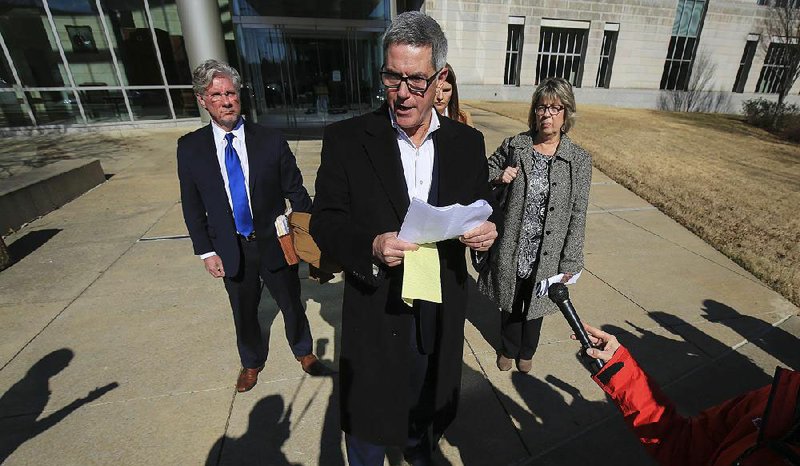A ruling Tuesday by U.S. District Judge D. Price Marshall Jr. has put an end to hopes of a former state senator and chairman of the state Republican Party to avoid a trial on bribery, wire-fraud and conspiracy charges contained in an indictment handed up by a federal grand jury in January 2019.
Absent a plea deal, Gilbert Baker, 64, of Conway, is scheduled to go to trial in federal court July 26 over allegations that he acted as a middleman in an effort to bribe former Faulkner County Circuit Judge Michael Maggio, who was running for a seat on the Arkansas Court of Appeals.
In July 2013, Maggio lowered a $5.2 million jury verdict against the owner of Greenbrier Nursing and Rehabilitation Center to $1 million. His action occurred on July 10, the day after 10 $3,000 checks written by the nursing home's owner, Michael Morton, arrived at the home of Baker, a friend and political ally of Maggio. The checks were made out to political action committees that were primarily helping Maggio's campaign for a seat on the state Court of Appeals.
The lawsuit had been filed against the nursing home by the family of 76-year-old Martha Bull of Perryville, who died in 2008 about two weeks after being admitted for rehabilitation for a stroke and an abdominal illness.
Baker's attorney, J. Blake Hendrix, filed two motions Dec. 4 to dismiss the indictment against Baker, saying the government had failed to allege the offenses against him and that a delay in issuing the indictment had hindered his defense.
The filing said because the indictment was not issued until 2019, text message communications between Baker and Maggio that would have exonerated Baker had been deleted. But a response filed Dec. 17 by Assistant U.S. Attorney Julie Peters said a forensic analysis of Baker's phone conducted by the FBI in October 2014 discovered that all text messages from May 7, 2013 to Jan. 17, 2014 had been deleted and could not be recovered.
"Baker may be prejudiced by the unavailability of the text messages," Marshall wrote in the order. "But even if the United States had indicted him in 2015 instead of 2019 those messages would still be unavailable. Baker is the one who had control of his phone when the messages were deleted. Any prejudice is not the result of the Indictment's timing."
Marshall said Baker's contention that he could not be held responsible for Maggio's actions because [Baker] lacked authority over state judicial funds expenditures didn't hold up because, under 18 USC 666(d)(1), "the plain language of the statute doesn't require authority over any funds and as such, was not required to prove a nexus between Maggio and Baker."
As to Baker's claim that the government failed to allege a quid pro quo, Marshall said the timeline of events between May 16, 2013, when a jury returned a $5.2 million verdict against Morton's nursing home, and July 10, 2013, when Maggio ordered the judgment reduced to $1 million -- one day after 10 $3,000 checks written by Morton arrived at Baker's home -- was sufficient evidence of a quid pro quo.
As to Baker's final argument that the money was "at most, a gratuity because the money didn't make it to Maggio's campaign until after he'd issued the remittitur Order," Marshall said the argument failed for two reasons.
"First, the Indictment alleges that Baker received the checks before Maggio ruled and then concealed the money in the PAC accounts until Maggio's campaign could receive it."
Second, Marshall wrote, it was the timing of the agreement -- before Maggio's official act -- that differentiates between a bribe and a gratuity, not the timing of the payment.
Maggio pleaded guilty in January 2015 to a bribery charge, for which he is serving a 10-year sentence in federal prison.
Morton, a Fort Smith businessman who hasn't been charged with a crime, has called the timing of the checks coincidental -- that the money was meant for Maggio's judicial campaign and was not an attempt to influence the outcome of the lawsuit. They were written July 8, 2013, the same day Morton's lawyers asked Maggio to void or slash the jury award to Bull's family.
Information for this article was contributed by Bill Bowden of the Arkansas Democrat-Gazette and by Tony Holt for the Arkansas Democrat-Gazette.
